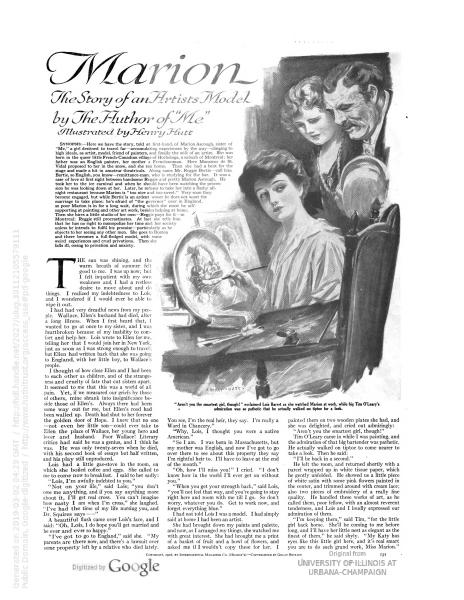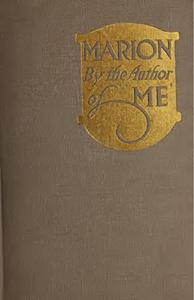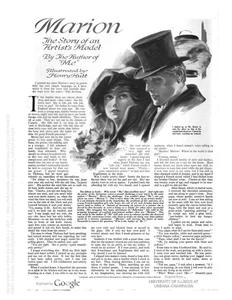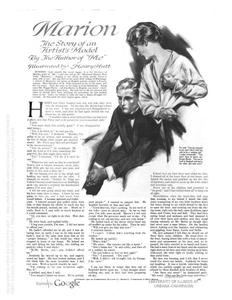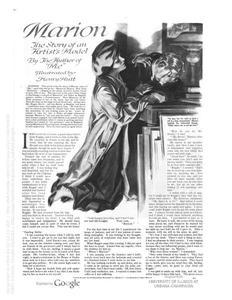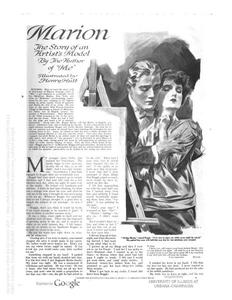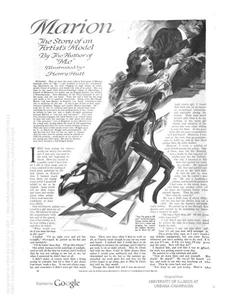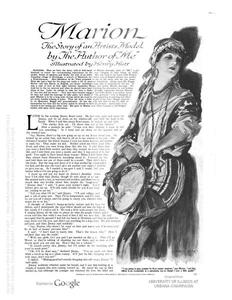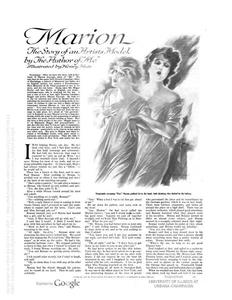The sun was shining, and the warm breath of summer felt good to me. I was up now;
but I felt impatient with my own weakness and I had a restless desire to move
about and do things. I realized my indebtedness to Lois, and I wondered if I would
ever be able to wipe it out.
I had had very dreadful news from my people. Wallace, Ellen’s husband had died,
after a long illness. When I first heard that, I wanted to go at once to my
sister, and I was heartbroken because of my inability to comfort and help her.
Lois wrote to Ellen for me, telling her that I would join her in New York, just as
soon as I was strong enough to travel; but Ellen had written back that she was
going to England, with her little boy, to Wallace’s people.
I thought of how close Ellen and I had been to each other as children, and of the
strangeness and cruelty of fate that cut sisters apart. It seemed to me that this
was a world of all pain. Yet, if we measured our griefs by those of others, mine
shrank into insignificance beside those of Ellen’s. Always there had been some way
out for me, but Ellen’s road had been walled up. Death had shut to her forever the
golden door of Hope. I knew that no one—not even her little son—could ever take to
Ellen the place of Wallace, her young hero and lover and husband. Poor Wallace!
Literary critics had said he was a genius, and I think he was. He was only
twenty-seven when he died, with his second book of essays but half written, and
his play still unproduced.
Lois had a little gas-stove in the room, on which she boiled coffee and eggs. She
called to me to come now to breakfast. I said to her sadly:
“Lois, I’m awfully indebted to you.”
“Not on your life,” said Lois; “you don’t owe me anything, and if you say
anything more about it, I’ll get real cross. You can’t imagine how nasty I am
when I’m cross,” she laughed. “I’ve had the time of my life nursing you,
and Dr. Squires says—”
A beautiful flush came over Lois’s face, and I said: “Oh, Lois, I do hope you’ll
get married and be ever and ever so happy.”
“I’ve got to go to England,” said she. “My parents are there now, and
there’s a lawsuit over some property left by a relative who died lately. You
see, I’m the real heir, they say. I’m really a Ward in Chancery.”
“Why, Lois, I thought you were a native American.”
“So I am. I was born in Massachusetts, but my mother was English, and now I’ve
got to go over there to see about this property they say I’m rightful heir to.
I’ll have to leave at the end of the month.”
“Oh, how I’ll miss you!” I cried. “I don’t know how in the world I’ll ever
get on without you.”
“When you get your strength back,” said Lois, “you’ll not feel that way,
and you’re going to stay here and room with me till I go. So don’t worry,
whatever you do. Get to work now, and forget everything blue.”
I had not told Lois I was a model. I had simply said at home I had been an
artist.
She had brought down my paints and palette, and now, as I arranged my things, she
watched me with great interest. She had brought me a print of a basket of fruit
and a bowl of flowers, and asked me if I wouldn’t copy these for her. I painted
them on two wooden plates she had, and she was delighted, and cried out
admiringly:
“Aren’t you the smartest girl, though!”
Tim O’Leary came in while I was painting, and the admiration of that big bartender
was pathetic. He actually walked on tiptoe to come nearer to take a look. Then he
said:
“I’ll be back in a second.”
He left the room, and returned shortly with a parcel wrapped up in white tissue
paper, which he gently unfolded. He showed us a little piece of white satin with
some pink flowers painted in the center, and trimmed around with cream lace; also
two pieces of embroidery of a really fine quality. He handled these works of art,
as he called them, poor fellow, with an almost reverent tenderness, and Lois and I
loudly expressed our admiration of them.
“I’m keeping them,” said Tim, “for the little girl back home. She’ll be
coming to me before long, and I’ll have her little nest as elegant as the
finest of them,” he said shyly. “My Katy has eyes like this little girl
here, and it’s real smart you are to do such grand work, Miss Marion.”
232
“Say, Mr. O’Leary,” I said, “I’m going to make you something to add to your
collection for your little girl.”
I kept my word, and in a few days I had painted on a piece of blue satin that Lois
found among her things a bunch of roses, which poor Tim declared he could almost
smell. That same evening he brought me two enormous whisky jugs. They were about
three feet high—sample bottles. They were of course, empty. Tim made the
astonishing request of me that I should paint on them, and he offered to pay
me.
So I painted a little seascape on one and a wreath of lilies-of-the-valley and
forget-me-nots on the other. Of course, I would not take pay from Tim for them.
The following day Tim came rushing in to tell me he had placed them on his bar,
and all of his friends and customers had thought them great, and one man offered
him five dollars apiece for them. He said that nothing would induce him to part
with them, but he was sending over to me all the big sample bottles he could get,
and also beer and wine and champagne bottles, and he said if I would paint on
these he would sell them for me. Well, the astonishing part is, that he did sell
them. I must have decorated at least twenty of those awful bottles, and Tim got me
about forty dollars for my work. So I was able to pay Miss Darling, and I went
over to the boarding-house where I still owed that bill and I paid it. To my
surprise the landlady tried to force two dollars back upon me.
“We all know how ill you’ve been,” she said, “and I said to my man: ‘We’ll
never see the color of that board money,’ and he says: ‘You’ll get it yet,’ and
you see he’s always right. So here, you can take two of it back, and may you
have the good luck your pretty face should bring you.”
Lois sailed on one of the small merchant liners, and it left the pier at five in
the morning, so we had to get up very early to see her off. We had sat up very
late the night before, and Dr. Squires had spent the evening with us and promised
to be at the pier to see her off. The morning was foggy and chilly. I clung
tightly to Lois before I let her go, and the doctor said:
“Here, give another fellow a chance.”
He, too, kissed Lois, and there were tears in both their eyes.
It is conceivably hard for a girl without a definite trade or profession, and
possessed of no particular talent, to earn her own living. With Tim O’Leary’s help
I had made a little money that tided me over for a time, but I realized that it
was merely a temporary relief. The artists would not be returning for a couple of
months, and I was in a quandary what I should do. A letter from Lil Markey, the
girl who had posed for Count von Hatzfeldt in Montreal, made me consider the
advisability of joining her in New York. This is Lil’s letter:
Dear Marion:
Here I am in little old New York. Been here two months now. I’m trying to
get a job on the stage, and I’ve almost landed one. You ought to come
here. There’s lots better opportunities, especially for a model. I have
all the work I can do just now posing for ‘The Banner,’ a theatrical
paper.
Now, there’s a fellow here who is going to get a bunch of girls and put
us in living pictures. All one needs is looks.
Say, why don’t you come on and join me here? I’ve a little flat with a
couple of other girls, and we need another to squeeze in and help pay the
expenses. I’d prefer you to anyone I’ve seen here. Say, some of them are
tough!
I was awfully sorry to hear about the old Count dying. Ada told me how
cut up you were about it, too. I’ve a date now—my meal-ticket!
With love,
LIL.
Lil’s letter had started my thoughts on an old trail. The desire to act came
creeping back on me. It was like an old thirst that suddenly awoke and tugged at
one’s consciousness insisting on being satisfied.
In Boston I had not thought to see theatrical managers. Reggie had long ago
successfully squelched my ambitions in that line. Now Lil’s letter and her
reference to Mr. Davis quickened a new hope within me.
258
Perhaps, as Lil wrote, conditions were better in New York. Certainly there should
be more work for a model, and perhaps I might in time really get on the stage. I
had enough money for my fare and a little over, and Boston appealed to me. Still,
I had not definitely decided to go until I had read the letter that came from
Reggie:
’Dearest old girl:
I am so glad you are keeping well, and have quite recovered from your
recent indisposition. I have been up to my eyes and ears in important
work. I’m going to run for the next sections for the ninth ward. What do
you think of that for a young and rising barrister? I’ll bet you are
proud of your Reggie, now aren’t you, darling? As for me, now that the
rush has let up a bit, I am simply famishing for the sight of my little
Marion, and now for the best news of all. I’m
leaving for Boston to-morrow evening, and I’ll be with you within a day!
There won’t be any more cross, stiff little letters coming to me from
Boston, from a strange Marion that’s not a bit like the loving little
girl I know. The States is no place for a girl like you, darling, and I’m
going there to fetch you home. Be at Grand Union Station at 8:15.
Your
’REGGIE.’
Feverishly I packed my clothes. I would go to New York! Reggie should not again
find me here to hurt me further.
My train would not leave till night and I had a few friends whom I wished to bid
good-by. When I was leaving the house I met Tim O’Leary, and he invited me to have
lunch with him. I smiled to myself as I sat opposite that bartender, thinking what
Reggie would say if he could see me, and I suddenly said to Tim:
“Tim, do you know, you are more of a real gentleman than the grandson of a duke
I know.” Tim’s broad red face shone.
When I said good-by to Rose St. Denis she took me in her arms like a mother.
“Enfant,” she said, “you are so t’in from
ze seekness, I have for you ze pity in my ‘eart. I will not see you face never
again, but I will make me a prayer to le bon
Dieu to pitifully tek care of my petite
soeur.”
“Oh, Rose,” I said, crying, “I’ll never, never forget you. I
think the thought of you will always keep me
good!”
I was fortunate in finding Dr. Squires in, though it was not his office-hour. He
seemed glad to see me, and when I said:
“Doctor, I am off for New York,” he answered:
“What’s the matter with Boston, then?”
I explained that I thought that I could do better in New York, and he agreed that
my chances there were more promising. Then I said: “Doctor, I want to thank you
for all your kindness to me and will you please tell me how much your bill
is?”
He had not only come to see me two or three times a day during my illness, but he
had also supplied all the medicines. He looked at me very seriously when I asked
for his bill, and then he said in a deep, thrilling voice:
“You do not owe me a cent. It is I who is indebted to
you.”
I knew what he meant, and oh, it did thrill me to think that my illness had
brought those two beautiful people together, Lois and her doctor. When I was going
out I said:
“Doctor, I am going on the stage. Perhaps I’ll succeed. Wish me good
luck.”
“I wish you the best of luck in the world,” he said cordially, “and I
wouldn’t be a bit surprised to hear of your success. You look like Duse,
Bernhardt, Julia Marlowe, and at times like a composite of all the great
actresses.” He did not laugh when he said that, and he wrung my hand warmly
as if he actually meant it.
Lil had a tiny little flat near Columbus Avenue. She was delighted to see me and
introduced me to the two other girls. They were both quite pretty, with bright
golden hair and wonderful complexions. Lil whispered to me that their hair was
bleached and she said that they got their complexions from the corner drug-store.
I suppose in the daytime I could have seen for myself, but I had arrived at night
and I was dead tired. The girls were all very friendly and later in the evening a
number of men friends called. I was too tired and sleepy to sit up with them and I
went to bed. The flat was so small that I could hear them talking and they seemed
to sit up all night. In spite of the noise of their chatter and laughter I went to
sleep.
I stayed with Lil in that flat for a month and we all shared expenses. I got work
right away with some advertising photographers who paid me $5.00 for a single
sitting—but that would take a good part of the day. Lil and the other girls posed
for “The Banner,” a kind of theatrical magazine, that ran pictures of
chorus-girls, etc. I remember one picture which showed the girls tumbling out of a
toboggan and another where they all were supposed to have fallen out of a street
car. I could have done this work too, but it seemed tawdry and dirty work to me,
and so long as I could get the photographic work I much preferred it.
In September we were all engaged to be living pictures by a man who was putting
them on in vaudeville houses. The subjects represented were strictly proper ones,
such as “Youth,” “Psyche,” “The Angelus,” “Rock of Ages,” etc.
We received fifteen dollars a week. As we lived cheaply and men were always taking
us out to dinners, our expenses were really small, and although Lil urged me to
get some new clothes, I paid off my debt to Lu Fraser.
I suppose I ought to have been contented, but the work seemed stupid to me. I
tired of the everlasting talk of chorus-girls. They all seemed to have but one
interest, and that was the stage. Mind you, not acting, but the
stage and all the cheap shop-talk that goes with it. What is more,
I was weary of Lil and her girl friends and their men friends. They sat up in the
little flat so late that it was almost impossible to sleep; and there was too much
drink and crazy laughter. It worked upon my nerves and I began to long for the
atmosphere of the studio once more. I thought that posing for the artists was,
after all, preferable to this cheap “acting.” So when an offer came to me of
twenty-five dollars a week as a show-girl in a popular “musical show,” I
refused it, although Lil and the other girls exclaimed enviously over my
“luck.” They seemed to think that I was out of my senses and shrieked at
me:
“What on earth do you want then?” and I replied wearily:
“I don’t know myself. I guess I just want to be let alone.”
How those girls did exclaim at that! Apparently, to them, I thought myself better
than they were; but indeed this was not the case. I just realized that our
interests were different. What seemed exciting and fine to them seemed to me just
stupid, and the miserable lot of little Willie boys who were always hovering about
us with their everlasting cigarets and silly short coats and foolish hats
disgusted me. The artists for whom I had worked in Boston were
men.
Thus I decided to leave Lil. Anyway there was some talk of their all going out
with a road show and they expected to give up the flat soon.
I had had a furious letter from Reggie the day after I arrived in New York, and we
had been quarreling by letter ever since. He accused me of deliberately leaving
Boston when I knew he was coming and he said: “It was a low-down trick and I
shall never forgive you.” In his anger he also wrote that perhaps the reason
for my leaving was that I knew he would find out the kind of life I had been
living there. He wrote:
“I met a few of your ‘friends’—a low down bartender and a store clerk” (poor
Billy Boyd’s room-mate, I suppose), “and let me compliment you on your choice of
associates. Your tastes certainly have not changed.”
I did not answer that first letter; but he wrote me another, apologizing, and at
the same time insinuating things. To that second letter I did reply, hotly. And so
it went on between us.
After leaving Lil’s, I found a little room on Fifteenth Street near Eighth Avenue.
It was cheap and fairly comfortable and I soon got settled down there. Then I
started out to look up some artists whose addresses had been sent to me by the
Boston men. Right away I secured several engagements. I found, moreover, that my
room was only a couple of blocks from what the artists called “Paresis Row”
on Fourteenth Street. Here many artists occupied the upper floors, which had been
turned into studios in these buildings, once the pretentious homes of mighty rich
people. On the lower floors various businesses were carried on.
I was sent to a man who had a studio in Paresis Row. He was a friend of Mr. Sands,
and although he did not use models, he said he would try to help me get work. He
explained to me his own kind of painting as “old-master pot-boilers.”
Sometimes, he explained to me, he got a rush of orders for “old masters,” and
then a number of fellows would get busy working on them. He declared humorously
that he ran an “old masters” factory.
As I looked at his work, I felt sure I could do that kind of painting, and I
said:
“Mr. Menna, would you let me try it, too?” and I told him about the work I
had done for the Count and about my father, and he exclaimed:
“Fine! you’re just the girl I’m looking for.”
So I went to work for Mr. Menna, part of the day. I would paint in the most of the
start, and he would finish up the pictures. “Clean them up and draw them
together,” as he would say. We were able this way to turn out many “old
masters.” We worked for the dealers and frame-makers, who in order to sell a
frame put these hastily-made oil paintings in and sent them out as “genuine
imported paintings.”
Mr. Menna and I became fast friends. He treated me just like any other
“fellow” and divided the profits with a generous hand. Besides helping him
to paint, I acted as his agent. I would go down-town and see the dealers, take
orders and sometimes sell to them the ones we made on speculation.
I found out many things in the “picture business” that I had never dreamed
possible, but that is another story.
At times, too, I posed for Mr. Menna. He would take spells when he became
disgusted with his “pot-boilers,” and would say he intended to do some
“real stuff.” These spells never lasted long, for he would run short of
money, and would start with renewed energy on the “painting business,” as he
disgustedly called it. He discovered that I was very good at copying, but he
discouraged my doing it. He said:
“There’s mighty little money in copying, unless you pass it off as the original,
and although the dealers do it, and I paint for them, I’m dashed if I’ll
actually sell them myself as original. It’s not honest.”
“But, Mr. Menna,” I argued, “isn’t it also dishonest for us to do the
copying and let the dealers pass it off and sell it as original?”
“Maybe it is,” he admitted, “but we don’t see them selling them to the
‘suckers’ who buy them, and confound it, we certainly don’t get the price, so
what the dickens—”
Mr. Menna had raised his voice, and immediately we heard a big noise from the
studio across the hall.
“It’s that bunch of fellows at Fisher’s,” said Menna grinning. “They get
together and all chip in to pay for a model. Say, how would you like to pose
for them? Most of them are illustrators, and they’d want you in street clothes
and things like that. You could make an extra dollar or two. Go up and see
Bonnat. He generally engages the model for the other fellows. You’ve met Fisher
here. He’s that little red-haired chap. Talk to him about it, too. Now I’m off
for lunch and a glass of beer. Come along if you like, Ascough.”
I went along with Menna. We ate in a little restaurant at the back of a saloon
corner of Eighth Avenue and Fourteenth Street. The lunch cost twenty-five cents
each. Menna did not eat much, but he drank four glasses of beer, and he got cross
with me when I at first refused to drink. So to please him I had a glass. He
said:
“Now you’re a good sport, and the beer will make you fat.”
“It’s not my ambition to be fat,” I laughed back.
“Get out,” he answered. “Did you hear that German fellow who was in the
studio the other day, when Miss Fleming” (Miss Fleming was Mr. Menna’s girl)
“asked him how he liked the American ladies? He said with a sad shake of his
head: ‘They are too t’in. The German wimmens have the perportions,’ and he
curved his hands in front of his chest as he said, ‘It is one treat to look at
her.’” Menna laughed heartily. “You’re a German yourself,” I said.
“Not on your life, I’m not,” denied Menna vigorously. “I’m American. Even
my folks were born here. I studied in Muenchen. That’s the place!” He shook
his head and sighed.
We got up to go, and Menna told me to hustle down town and see a dealer.
Jacobs, the dealer, was busy showing some customers the paintings. The place was
softly lighted, and the paintings were shown off to the best advantage by the
arrangement of the lights. There were a number of Oriental rugs about, helping to
make the place look luxurious, and adding somehow to the value of the paintings.
Jacobs nodded to me, and I sat down to wait.
As soon as the customers were gone, he called me over and, pointing to a couple of
paintings in elaborate gold frames, he said:
“Those people who were in are furnishing their new home on Riverside Drive, and
I expect to sell them quite a few paintings. They got stuck on those two, and I
made a price on them. Now, those two are already sold, and the party who bought
them wants them delivered next week. You have to come in time, Miss Ascough, as
I must have these copied right away. Can you get me an artist to do it?”
I looked at those paintings. They were about sixteen by twenty-eight inches, and
the subject of one was a Breton field of wheat and harvesters, and the other was
of a priest or cardinal in his red robes sitting reading in a richly furnished
library. Menna, I knew, could not possibly do the work that week, for he was
working out an order for another dealer, and I had come to Jacobs to collect for
old work. I thought, however, that I could easily do it myself. So I said to
Jacobs:
“I know a woman artist who’ll do it for you.”
“A woman! No, sir! I would not have a woman do any work for me,” said the
dealer. “I have had all I want to do with women artists. They do much inferior
work to the men, take twice as long, and get swelled heads about it. They whine
if they don’t make a fortune out of their daubs. No—nothing doing with the
women. Now I like Menna’s work. Take them to him. Don’t let anyone see them,
and I’ll very likely be able to have them copied again, as I think they’ll
prove good sellers.”
“All right,” I said, but I made up my mind to do them myself, and I went out
with those precious “imported” paintings under my arm.
Mr. Menna was showing some of his “pot-boilers” to a man when I returned.
They were paintings of little ragged boys. The man did not care for them. As he
was going out he said:
“I’ll come again some day when you have other pictures. Those little-boy
pictures are nice, and I like them, but they are not parlor
pictures, and my customers want parlor pictures.”
Menna was puffing angrily on a big cigar. I laughed as the man went out, but Menna
could not see the humor of it. He got angrier and angrier. He threw down his
palette and brush and let out a big anathema.
“I hope you feel better now, Mr. Menna,” I ventured.
“That’s the kind of thing one is up against,” he roared, “and that fool,
Bonnat, was in here a while ago and he told me he had refused to make some
alteration in the portrait he is painting of the wife of that rich Dr. Craig,
because the ass said he would not prostitute his art, and a lot of stuff like
that. It makes me sick. He also lost a good chance to had to make illustrations
for a magazine—best-paying magazine in New York. He had his own ideas about the
illustrations, and as they were paying for the job they told him how they
wanted them smooth cut. Bonnat belongs to the new school of painting, and he
actually refused to please them—missed a chance almost any artist would be glad
to get. He’s a chump.”
I was getting excited. In a dim way I was beginning to see something else in Art
than “the picture business.” It reminded me of how poor Wallace, Ellen’s
husband, used to talk of literature. I secretly admired this Bonnat for his stand
and his courage.
“Is Mr. Bonnat a Frenchman?” I asked.
